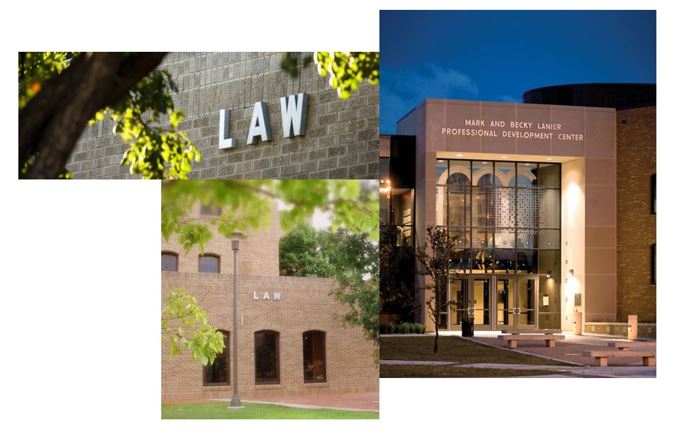Texas Tech Law School Library
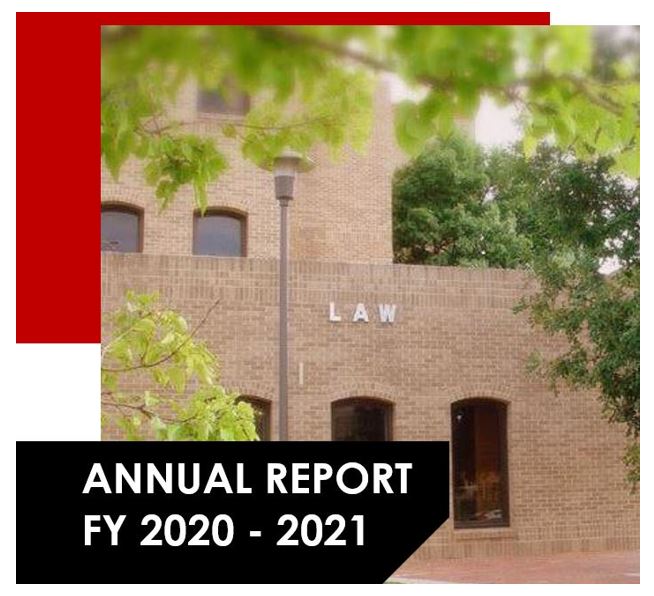
INTRODUCTION
During the continued disruptions of COVID-19, the Texas Tech Law Library remained dedicated to providing the services that the Law School needed to be successful! The Law Library did this by incorporating all six ABA standards for “Library and Information Resources” including 601 General Provisions, 602 Administration, 603 Director of the Law Library, 604 Personnel, 605 Services, and 606 Collection into our daily work. Our Annual Report shows how we met the ABA standards.
The Law Library is a huge part of our student-centered law school, helping to develop effective, ethical lawyers and leaders for Texas and the diverse world of the 21st century. The ABA standards for “Library and Information Resources” is a starting point for our services.
COVID-19 brought many changes and challenges to how we provided serviced. During this fiscal year, the law library continued with limited hours and services. However, the law library will continue to add back hours and levels of service as the COVID-19 threat recedes.
EXPERTISE, SERVICES, AND RESOURCES
The expertise of our employees along with our resources and services defines who we are. Here are some of the services and resources we provided to our students and faculty during FY2020-21.
EXPERTISE
Librarian and staff expertise is demonstrated in many ways. The law librarians teach for-credit classes on a wide variety of topics, which highlights their varied backgrounds and interests. During FY2020-21, librarians expressed their expertise in new and different ways. COVID-19 brought online teaching and student interactions online. Our librarians jumped into learning Blackboard, Zoom, and other online platforms and not only taught their classes online but also were at the forefront in helping faculty adjust to the online instruction world.
Here are some of the for-credit classes that our librarians taught this fiscal year.
♦ Texas Legal Research
♦ Civil Trial: Practice & Litigation Material
♦ Foreign, Comparative, & International Research
♦ Law and Science Legal Research
♦ Academic Legal Writing
Each of these classes occurred during either the fall 2020 or spring 2021 semester.
Circulation staff is well trained and able to help patrons with any questions they have. Staff are able to guide patrons where they can receive the assistance they need even with limited services. During FY2020-21, our circulation staff have been in the library keeping the library going during COVID-19.
Most of our Circulation staff have 15+ years of experience and have a deep understanding of the Law School, which enables them to provide excellent service. Our staff is also friendly and enjoys our students. Our staff participate in events with the students and help to provide a welcoming atmosphere.
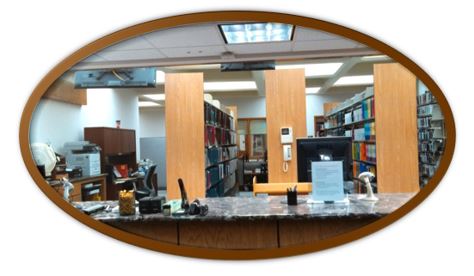
SERVICES
Stress Busters
Sometimes you need a break from the stress of law school. It does not matter who you are, student, faculty, staff; we all need some stress relief! The Law Library offers a wide array of stress busters and fun events for everyone to enjoy. Here are some of the events offered during FY2020-21.
♦ National Library Week
♦ Poetry Slam (co-sponsored with BLSA)
Like other aspects of our services, we were not able to offer many stress busters in the library. Most of our efforts were online including our National Library Week contests. One program we did have in the library was our BLS co-sponsored Poetry Slam.
SOCIAL MEDIA
The Law library continues to focus on improving communication with our patrons through different types of social media interaction. This was especially important during FY2020-21! The Law Library has social media pages on Twitter, Facebook, and The Reporter (blog). All social media activity is interrelated; for example, a blog post in The Reporter is also promoted on Twitter and Facebook.
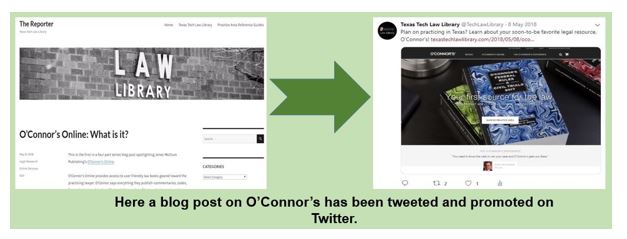
The Law Library has started pushing our social media presence during the last few fiscal years. Check out both our Twitter page, https://twitter.com/techlawlibrary?lang=en, and Facebook page, https://www.facebook.com/TTULawLibrary/. See for yourself what you are missing!
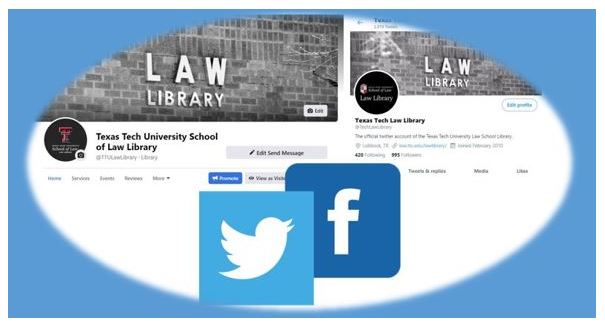
On our social media pages, the Law Library promotes what is occurring at the Texas Tech Law School. Our accounts retweet posts from our faculty, promote faculty publications and achievements, as well as activities that occur at the Law School. This holistic approach makes our accounts a one-stop place to find out what is happening at the Law School and helps the promotional activities of our Communications Departments and the Office of Academic Success Programs (OASP). This way we are all working together for the success of our students and faculty.
RESOURCES
The resources we offer our patrons come in many forms. We have our people resources, librarians, and staff who all work together to ensure that our faculty and Law School staff have what they need to be successful. We also offer informational resources; our knowledge, materials, and our ability to pass that information along whether it be in a classroom or at the circulation desk. We also provide necessary stress outlets and fun events to help foster a close-knit environment that supports our faculty and students. We also provide ways to pass this information along to our patrons. One way we do that is through our message board.
Our message board displays signage to promote events, resources like new databases, information (safety information, changes to hours, etc.), encouraging messages, contests, and programs. The message board is outside the library entrance so everyone in the building can see what is happening in the law library.
Another resource we offer our students is study room space. The Law Library offers three small group study rooms and three larger media equipped study rooms. These rooms are available on a first-come-first-served basis and help provide much-needed study space in the library. These rooms may be reserved or booked through an on-line system that is available through our automated library system.

Another, very popular, resource is our LibGuides. The Law Library has curated a collection of over 70 LibGuides on a wide variety of topics. The LibGuides are generally designed to reinforce material taught in various classes; including classes taught in the ELR program, doctrinal classes, and other programs like our Technology CLE. During FY2020-21 there were 88,004 total views of our LibGuides! This is a 59% usage increase over the last fiscal year. Views of the top ten LibGuides represent 86% of the total views or 75,517 views. The chart below illustrates the top ten LibGuides and their total number of views.

Our resources make up a significant part of the services offered to Law Library patrons. These resources provide a needed service and offer a huge benefit to our patrons!
LAW LIBRARY FACULTY AND STAFF
During FY2020-21, there were many happy occasions and reasons to celebrate, including hiring two new Library Associates, Jessica Guardado and Diane Vargas!
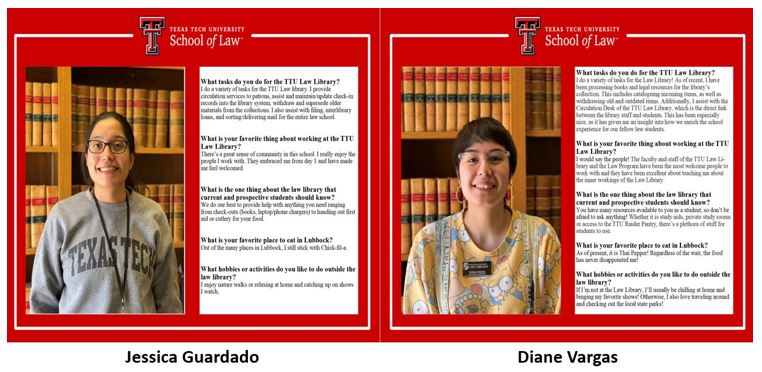
Unfortunately, we also saw the departure of two faculty librarians, Alyson Drake and Janeen Williams. Alyson Drake joined the Fordham Law Library staff as the Instructional Services Librarian. Janeen Williams joined the Fowler School of Law as the Associate Director for Law Library Services. Congratulations to both Alyson and Janeen on their new positions!
The Law Library also hired Brittany Morris-Easley as our new User Services Librarian. She came here from the University of Houston Law Center and was their Projects Librarian. Brittany started in July 2021. Welcome, Brittany!!!

REFERENCE AND INSTRUCTION
What many consider the heart and soul of a Law Library are the Reference and Instruction departments. These two areas make up most of the services offered by the Law Library and have the most direct impact on how the library serves the Law School.
Reference
The Law Library has a dedicated person available for reference assistance, which allows us to provide reference service 52 hours per week. Librarians are not sitting at a desk; instead, librarians are in their offices providing on-call services. This allows the librarians to monitor the reference email, work on other projects, and be available for reference calls from the Circulation desk.
Librarians receive most of their reference questions from people either going to their offices or receiving questions if via e-mail and over the phone. The chart below shows this break-down.
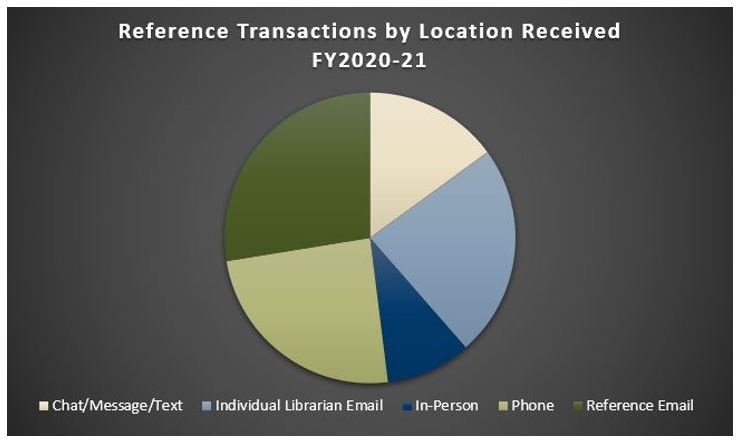
The vast majority of the 127 reference questions librarians received are from students. 61% of the questions librarians answer are from students! The remaining questions come from the public, faculty/staff, and others.
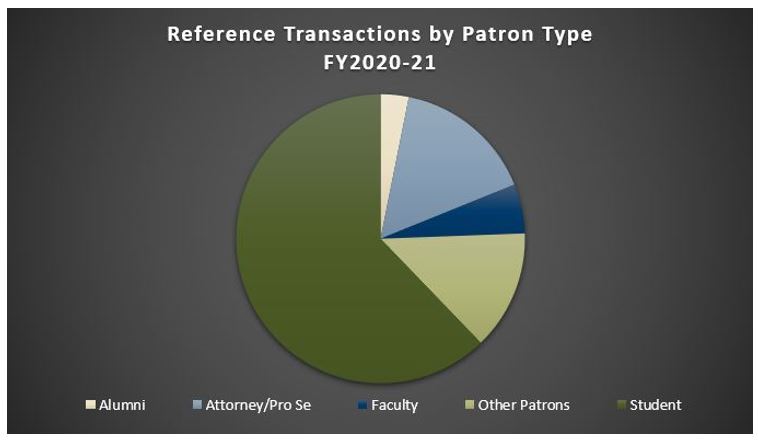
(NOTE: In this graphic, most faculty reference services are maintained in a different system and are discussed elsewhere.)
Instruction
During the past three fiscal years, the Faculty Law librarians have increased their teaching and other interaction time with students and faculty. The Faculty Law librarians believe that the increase in time and variety of interactions will help the law students be more productive, better educated, and maintain positive mental health.
Our Faculty Law librarians offer several non-credit instruction opportunities for law students, faculty, undergraduate students, and legal professionals. During FY2020-21 the Faculty Law librarians taught a total of 121 sessions for 1,784 students, faculty, undergraduates, and legal professionals!
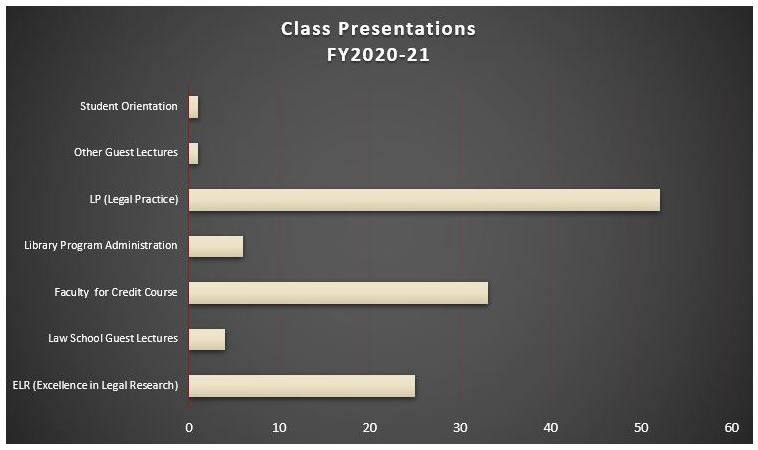
Faculty Law librarians teach these classes to help make concrete connections to the Law School’s program of legal education. The Faculty Law librarians help further this purpose through their various types of instruction.
Our Faculty Law librarians are at the forefront of legal instruction. The Faculty Law librarians consciously strive to use new and innovative techniques, including using formative and summative assessments in all the classes they teach; both for-credit and non-credit classes. Below are some of the types of instruction the Faculty Law librarians conduct.
For-Credit Instruction
The Faculty Law librarians are on the tenure track and part of their tenure requirements is to teach for-credit courses. The Faculty Law librarians focus on engaging with students and helping them fulfill their goals of becoming practice-ready lawyers. All the for-credit classes help student outcomes by including various legal proficiencies within each of the for-credit courses. Faculty Law librarians also provide guest classroom presentations in other classes, teaching on various aspects of legal research.
Distant Education
Texas Tech Law School provides a limited number of distant education classes, one of these taught by our Faculty Law librarians. Faculty Law librarians also help other faculty with their Blackboard class sites. Through their efforts, Faculty Law librarians are at the forefront of distance education technology and best practices. This allows us to help our faculty navigate their adventures into distant education.
Individual Student Consultations
Faculty Law librarians also provide student consultations to help guide students with both first-year writing experiences and with upper-level writing. Legal writing is an important skill for all law students to master and the Faculty Law librarians help guide students and answer questions with individual consultations. No matter the type of legal writing help the Faculty Law librarians are providing, they use “directed research” to help students with their independent research study. This guarantees that students are receiving the best writing help possible.
Supporting Scholarly Writing
The Faculty Law librarians also support legal writing expertise through extra programming and workshops to help guide students through the research/writing process. These workshops occur on Saturday mornings and allow the Faculty Law librarians to focus exclusively on student writing. The Faculty Law librarians will discuss a particular aspect of legal writing and then help students as they work on their individual writing projects. This intensive help is a great way to support the students as they work to master legal writing.
Excellence in Legal Research Program (ELR)
The Faculty Law librarians also teach a variety of other classes that are not-for-credit including classes for our Excellence in Legal Research Program or ELR. ELR is our nationally recognized extracurricular program in legal research that provides students with hands-on training in the skills, sources, and strategies they will need for performing effective legal research throughout their careers. This program provides an innovative way to help students master legal research and help them prepare for real-world research experiences. After all, associates on average, spend 35% of their time doing legal research!
A student who graduates from the program must complete a minimum of 20 hours of legal research instruction and assessment. The classes include a mix of basic research skills (how to develop a research strategy and how to use citators) as well as information on federal and Texas legal materials (statutory, legislative, and administrative sources), not to mention newer classes on law practice technology. These classes provide students a well-balanced legal research platform.
Students graduate at the end of the semester in which they complete the program requirements. There is a celebratory reception held for the graduates at the end of the spring semester. This reception is for all the graduates of that fiscal year.
Non-Credit Instruction
Faculty Law librarians also teach various types of non-credit classes to help students and faculty. These classes are taught to law students, undergraduates, and legal professionals. Examples of these types of classes include:
♦ Student Organizations presentations (law students)
♦ Legal Practice class presentations (law students)
♦ Faculty trainings (faculty)
♦ Doctrinal class presentations (law students)
♦ 1L Orientation (law students)
♦ Student Services Fair
Our faculty law librarians offer a significant amount of non-credit instruction for law students, faculty, undergraduate students, and legal professionals. Our faculty law librarian’s instruction levels for FY2020-21 is especially impressive due to the continued limits experienced due to COVID-19 restrictions.
Faculty Requests
There were 81 total requests from faculty with the vast majority of faculty taking advantage of library services. The Law Library dedicated a little more than 301 hours fulfilling faculty requests. On average, each request took approximately 3.7 hours to complete.
ELECTRONIC SERVICES
In FY 2021, the Law Library’s Electronic Services Unit completed numerous projects. First, the Unit deployed several new services, including re:SearchTX, VerdictSearch, Law.com, TexasLawbook. The Unit re-deployed existing electronic services due to the vendors’ rebranding, including Aspen Learning Library (formerly Wolters Kluwer Online Study Aids) and VitalLaw (formerly Cheetah). The Unit also planned and coordinated Law Library database access changes to comply with the Ray Baum Act. Next, the Unit prepared the subscription database per-usage cost for the Law Library’s database purchase/cancellation decision making. The Unit also prepared electronic resource folders for new 1L students. The Unit further proposed and administered a new LibGuides plan, supporting the legal research and upper-level writing curriculum. Finally, the Unit drafted the first-ever Electronic and Digital Services Manual.
The Unit continues to digitize and archive the Law School’s intellectual achievements, including student-edited journals and faculty scholarship, into ScHOLAR. In addition, the Unit processed ten years of the Texas Banking Lawyer, which are ready to be deposited into ScHOLAR. The Unit also provided training for new student assistants on writing abstracts for ScHOLAR.
COLLECTIONS AND INSTITUTIONAL REPOSITORY
The Law Library provides many different types of resources for our patrons. The most common resource is library materials. The law library provides over 684,000 titles for our patrons. These items include print materials, electronic titles, microfiche, and other items. The Law Library is open 168 hours per week, and we provide reference service 52 hours per week.
Collections
One important resource we provide for our patrons, especially for our faculty and students, is our materials. The Law Library provides a wide variety of materials to help supplement the research and study done by faculty and students. There are books, journals, continuations, electronic databases among others. The chart below shows the material budget for FY2020-21.
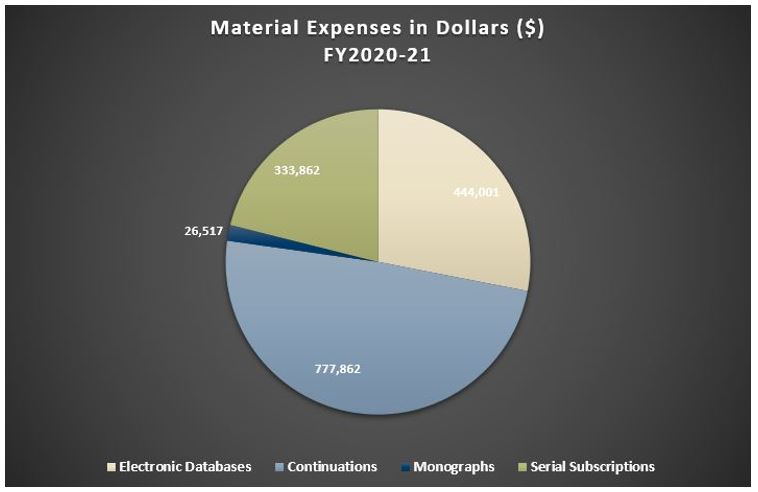
Providing various resources to help our faculty and students with their research needs is a primary focus for our law library. We strive to provide material that is necessary for our students and faculty in the most cost-effective format.
CIRCULATION SERVICES & OPERATIONS
Our Law Library Circulation Desk is not just for checking out material, but it is also a resource center for anyone who needs help. Our Circulation staff is trained to help answer and direct patrons to the resources they need. The Circulation Desk also provides many helpful services like; date stamping, faxing, mail drop-off, umbrellas, aspirin, and other quick medical supplies, sporting equipment, directions, and a friendly smile! The two charts below illustrate some of the activities we see at the Circulation Desk.
During FY2020-21, staff provided over 4,856 assists to our patrons! The largest number of people we help by far is our students! This allows us to get to know our students and faculty provide personalized service and have truly meaningful contact with them. This is one of our biggest strengths as a law library!
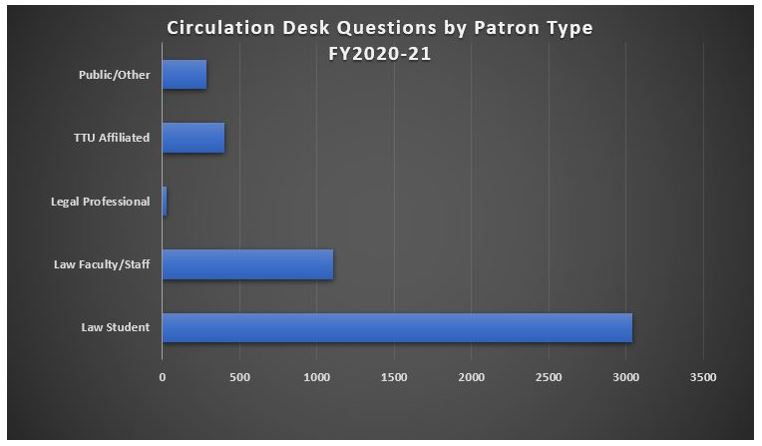
Since we are the Circulation Desk, we also check out library material. During FY2020-21 the Law Library checked out 3,080 items to our patrons.

We checked out 756 books during the fiscal year. We also have a significant number of people who visit the Law Library. During FY2020-21 there were 38,152 people visiting the Law Library. The gate count always reflects the seasonal usage of the Law Library. It starts getting busy in August and usually peaks in October and April then dips during December and the summer months of June and July. This year was different in that we had a limited number of visitors to the library during the fiscal year.
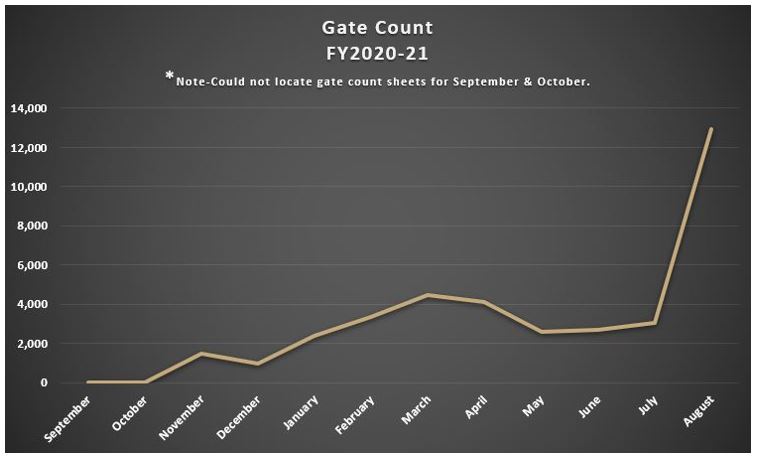
The Texas Tech Law Library will continue to work towards supporting our students and faculty in their goal of training and preparing our future lawyers. This is true no matter the circumstances. This year COVID-19 continued to have a significant impact on the law library, law school, faculty, staff, and students. It has impacted all areas of the library and made tradition service impossible. However, faculty and staff persevered and managed to provide important and necessary services to the law school even during some difficult and stressful circumstances.
OPERATIONS
During FY2020-21, the Operations staff was able to get caught up on the processing backlog caused by the COVID-19 shutdown. The backlog included mail that had accumulated while we were all out of the office, but also an increase in mail being delivered by publishers who had cease to deliveries during the Spring of 2020.
Operations was the focus of the Law Library’s social distancing and management of library space to meet the demands imposed by the COVID-19 pandemic. Operations staff coordinated with law school administration, the overall response to COVID-19. This included monitoring supplies of PPE, serving as weekend building monitors during expanded hour periods, and providing information and support to students.
Finally, staff also tried to provide students who were feeling cut off and isolated by the pandemic, support, and contact.
